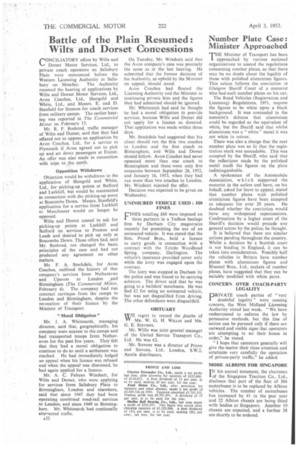Battle of the Plain Resumed: Wilts and Dorset Concessions
Page 34

If you've noticed an error in this article please click here to report it so we can fix it.
CONCILIATORY offers by Wilts and • --• Dorset Motor Services, Ltd., to private coach operators on Salisbury Plain were announced before the Western Licensing Authority at Salisbury on Monday. The Authority resumed the hearing of applications by Wilts and Dorset Motor Services, Ltd., Avon Coaches, Ltd., Shergold and White, Ltd., and Messrs. E. and D. Stanfield for licences for coach services from military camps. The earlier hearing was reported in The Commercial Motor on February 13. Mr_ R. F. Bushrod, traffic manager of Wilts and Dorset, said that they had offered not to oppose an application by Avon Coaches, Ltd., for a service to Plymouth if Avon agreed not to pick up and set down passengers at Exeter. An offer was also made in connection with trips to the north.
Opposition Withdrawn
Objection would be withdrawn to the application of Shergold and White, Ltd., for picking-up points at Bulford and Larkhill, but would be maintained in connection with the picking-up point at Boscombe Down. Messrs. Stanfield's application for a service from Larkhill to Manchester would no longer be opposed.
Wilts and Dorset ceased to ask for picking-up points at Larkhill and Bulford on services to Preston and Leeds and desired to pick up only at Boscombe Down. These offers had, said Mr. Bushrod, not changed the basic principles of the case and had not produced any agreement on other matters.
Mr. F. A. Stockdale, for Avon Coaches, outlined the history of that company's services from Netheravon and Upavon to London and Birmingham (The Commercial Motor, February 6). The company had run contract carriages from the camps to London and Birmingham, despite the revocation of their licence by the Minister of Transport.
"Moral Obligation" Mr. J. A. Whitmarsh, managing director, said that, geographically, his company were nearest to the camps and had transported troops from Netheravon for the past few years. They felt that they had a moral obligation to continue to do so until a settlement was reached. He had immediately lodged an appeal when his licence was refused and when the appeal was dismissed, he had again applied for a licence.
Mr. A. C Fabyan Windeatt, for Wilts and Dorset, who were applying for services from Salisbury Plain to Birmingham, London and elsewhere, said that since 1947 they had been operating combined road-rail services to London, and since 1949 to Birmingham. Mr, Whitmarsh had continually abstracted traffic.
A32 On Tuesday, Mr. Windeatt said that the Avon company's case was precisely the same as .at the last hearing. He submitted that the former decision of the Authority, as upheld by the Minister on appeal, should stand.
Avon Coaches had flouted the Licensing Authority and the Minister in continuing private hire and the figures they had submitted should be ignored.
Mr. Whitmarsh had said he thought he had a moral obligation to provide services, because Wilts and Dorset did not apply for a licence as directed. That application was made within three days.
Mr. Stockdale had suggested that his client should run the first two coaches to London and the first coach to Birmingham, and Wilts and Dorset should follow. Avon Coaches had never operated more than one coach to Birmingham and there were only five occasions between September 28, 1952, and January 16, 1953, when they had run more than two coaches to London. Mr. Windeatt rejected the offer.
Decision was expected to he given on Wednesday.
UNINSURED VEHICLE USED: 160
FINES, FINES, FINES totalling £60 were imposed on three partners in a Tudhoe haulage firm by Durham City magistrates recently for permitting the use of an uninsured vehicle. it was stated that the firm, Proud Bros., held a licence to carry goods in connection with acontract with the Toledo Woodhead Spring company, Darlington. The vehicle's insurance provided cover only white the lorry was engaged upon the contract.
The lorry was stopped in Durham by the police and was found to be carrying asbestos. The driver said that he was going to a builders' merchants. He was find £2 for using an uninsured vehicle, but was not disqualified from driving. The other defendants were disqualified.




























































































